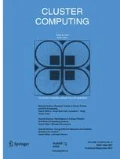Abstract
In anAdhoc Cloud as a Service (Adhoc Cloud is used over MANETs), the attackers try to interrupt the data packets being broadcasted in the network between the nodes, which travels from source to destination. To solve this problem, Beer–Quiche theoretical routing model is utilized for stochastic multipath routing in MANETs. Initially, the path setup and route selection is regulated using proposed approach. During each stage, the source node tracks the available paths, path residual bandwidth and policy of the attackers, who gathers information from previous stage to provide an attack. Depending on such selection, the optimal paths are selected by the source node for broadcasting the packets. This is selected using a proper switching mechanism in multiple paths which is established between the source and destination. Further, an optimal routing selection policy is proposed to broadcast the packet to its destination node during each stage of the Beer–Quiche game. The numerical analysis proves that the proposed scheme attains better performance than AODV, AOMDV, CA-AOMDV, FS and MR in terms of reduced end-to-end delay, better residual bandwidth utilization, routing overhead, packet delivery ratio and increased path security. The results shows that the packet transmission has increased nearly to 68%, with 17% reduction in packet delay transmission. This has resulted in reducing the overhead by 25% than the AODV method.









Similar content being viewed by others
References
Sarkar, S., Datta, R.: AODV-based technique for quick and secure local recovery from link failures in MANETs. Int. J. Commun. Netw. Distrib. Syst. 11(1), 92–116 (2013)
Anderegg, L., Eidenbenz, S.: Ad hoc-VCG: a truthful and cost-efficient routing protocol for mobile ad hoc networks with selfish agents. In: Proceedings of the 9th annual international conference on Mobile computing and networking (pp. 245–259). ACM (2003)
Osborne, M.J., Rubinstein, A.: A Course in Game Theory. MIT Press, Cambridge (1994)
Li, F., Yang, Y., Wu, J.: Attack and flee: game-theory-based analysis on interactions among nodes in MANETs. IEEE Trans. Syst. Man Cybern. 40(3), 612–622 (2010)
Chen, X., Jones, H.M., Jayalath, D.: Channel-aware routing in MANETs with route handoff. IEEE Trans. Mob. Comput. 10(1), 108–121 (2011)
Yu, W., Liu, K.R.: Game theoretic analysis of cooperation stimulation and security in autonomous mobile ad hoc networks. IEEE Trans. Mob. Comput. 6(5), 507–521 (2007)
Nisan, N., Ronen, A.: Computationally feasible VCG mechanisms. J. Artif. Intell. Res. 29, 19–47 (2007)
Liu, J., Jiang, X., Nishiyama, H., Miura, R., Kato, N., Kadowaki, N.: Optimal forwarding games in mobile Ad Hoc networks with two-hop f-cast relay. IEEE J. Sel. Areas Commun. 30(11), 2169–2179 (2012)
Liu, J., Jiang, X., Nishiyama, H., Kato, N.: Generalized two-hop relay for flexible delay control in manets. IEEE/ACM Trans. Netw. (TON) 20(6), 1950–1963 (2012)
Wang, B., Wu, Y., Liu, K.R., Clancy, T.C.: An anti-jamming stochastic game for cognitive radio networks. IEEE J. Sel. Areas Commun. 29(4), 877–889 (2011)
Marina, M. K., Das, S. R.: On-demand multipath distance vector routing in ad hoc networks. In: 9th International Conference on Network Protocols, pp. 14–23, IEEE (2001)
Perkins, C., Belding-Royer, E., Das, S.: Ad hoc on-demand distance vector (AODV) routing (No. RFC 3561) (2003)
Sarkar, S., Datta, R.: A secure and energy-efficient stochastic multipath routing for self-organized mobile ad hoc networks. Ad Hoc Netw. 37, 209–227 (2016)
Hamieh, A., Ben-Othman, J.: Detection of jamming attacks in wireless ad hoc networks using error distribution. In: IEEE International Conference on Communications ICC’09, pp. 1–6, IEEE. (2009)
Washburn, A., Wood, K.: Two-person zero-sum games for network interdiction. Oper. Res. 43(2), 243–251 (1995)
Tahir, A., Abid, S.A., Shah, N.: Logical clusters in DHT-paradigm for scalable routing in MANETs. Comput. Netw. 128, 142–153 (2017)
Singal, G., Laxmi, V., Gaur, M.S., Todi, S., Rao, V., Tripathi, M., Kushwaha, R.: Multi-constraints link stable multicast routing protocol in MANETs. Ad Hoc Netw. 63, 115–128 (2017)
Al-Maqbali, H., Day, K., Ould-Khaoua, M., Touzene, A., Alzeidi, N.: A new hybrid grid-based routing approach for manets. Proc. Technol. 17, 81–89 (2014)
Abdulwahid, H., Dai, B., Huang, B., Chen, Z.: Scheduled-links multicast routing protocol in MANETs. J. Netw. Comput. Appl. 63, 56–67 (2016)
Zaghdoudi, B., Ayed, H.K.B., Riabi, I.: Ad hoc cloud as a service: a protocol for setting up an ad hoc cloud over MANETs. Proc. Comput. Sci. 56, 573–579 (2015)
Muhamet Yildiz,: 14.12 Game Theory Lecture Notes Lectures 15–18, http://web.mit.edu/14.12/www/02F_lecture1518.pdf
Author information
Authors and Affiliations
Corresponding author
Rights and permissions
About this article
Cite this article
Sathiya, D., Gomathy, B. Improved security and routing path learning in MANETs using Beer–Quiche game theoritical model in cloud computing. Cluster Comput 22 (Suppl 1), 21–31 (2019). https://doi.org/10.1007/s10586-017-1599-4
Received:
Revised:
Accepted:
Published:
Issue Date:
DOI: https://doi.org/10.1007/s10586-017-1599-4




